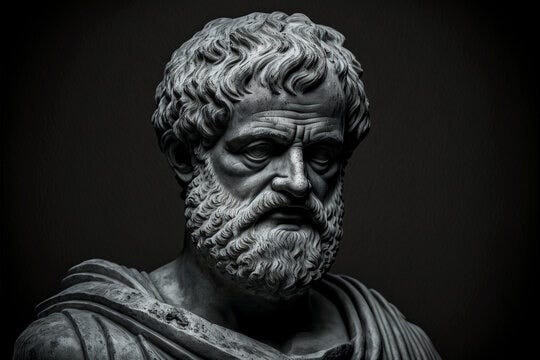Aristotle: The Foundations of Western Philosophy and Science
Written on
Chapter 1: The Life and Legacy of Aristotle
Aristotle, who lived from 384 to 322 BC, stands as one of the most pivotal figures in Western philosophy. He was born in the small town of Stageira in Northern Greece to Nicomachus, a physician at the Macedonian court. This connection facilitated his later role as a tutor to Alexander the Great.
At the age of 17 or 18, Aristotle relocated to Athens to study at Plato's Academy, where he would remain for two decades, deeply absorbing Plato's teachings. While Aristotle greatly admired Plato, he later critiqued several of his ideas and developed his own philosophical perspectives.
Following Plato's death, Aristotle was invited back to Macedonia by King Philip II, taking on the role of tutor for his son, Alexander. He dedicated several years to this task before Alexander became king.
Upon Alexander's ascension, Aristotle returned to Athens, founding his own school, the Lyceum. There, he dedicated the remainder of his life to the study, teaching, and writing on a wide range of topics, including physics, biology, metaphysics, logic, ethics, aesthetics, poetry, theatre, music, rhetoric, linguistics, politics, and governance. These lectures laid the groundwork for his extensive body of written work.
Aristotle’s philosophical contributions include "Metaphysics," where he introduced the idea of 'substance' and expanded on Plato’s theory of forms into his concepts of 'actus' and 'potentia.' In "Nicomachean Ethics," he investigated virtue, pleasure, friendship, and happiness, proposing the 'golden mean' as a moral guideline lying between extremes. His work "Politics" elaborated on his vision of an ideal city-state.
In the realm of science, his texts like "Physics," "On the Heavens," and "Parts of Animals" pioneered empirical methods, which significantly advanced scientific inquiry.
Aristotle's impact on Western thought, especially in the humanities and social sciences, is largely due to his modifications, expansions, and critiques of Platonic ideas. Many consider much of Western philosophy to be a series of annotations on the thoughts of Plato and Aristotle.
Despite facing criticism and being overlooked during the Christian medieval period, Aristotle's works experienced a revival during the Renaissance and continue to be integral to philosophy education globally. His influence spans across logic, science, metaphysics, ethics, politics, and linguistics.
Aristotle’s Wisdom on Self-Knowledge
“Knowing yourself is the beginning of all wisdom.”
Aristotle emphasized that self-awareness is essential for understanding our environment. He argued that genuine wisdom begins with introspection; only by truly comprehending ourselves can we formulate insightful opinions about others and the world around us.
This belief is closely tied to Aristotle’s views on ethics and human nature. He posited that every individual seeks 'eudaimonia,' a term often interpreted as ‘happiness,’ ‘flourishing,’ or ‘the good life.’ However, he maintained that achieving 'eudaimonia' necessitates an understanding of our own nature, capabilities, and tendencies. This process involves recognizing our virtues (positive traits) and vices (negative traits) and striving to enhance the former while minimizing the latter.
His 'Golden Mean' theory further reinforces this idea, advocating for a balanced approach between extremes. For example, to cultivate the virtue of courage, one must navigate the space between recklessness and cowardice. Achieving this balance requires deep personal reflection, underscoring the importance of self-knowledge.
Ultimately, leading a meaningful, ethical life—and gaining broader wisdom about the world—begins with understanding ourselves.

Chapter 2: Exploring Aristotle's Philosophical Teachings
In the video "How Aristotle Thought about the World," viewers delve into the profound insights of Aristotle's philosophical principles, exploring how his thoughts shaped our understanding of the universe.
The video "Self Directed Study in Philosophy | Aristotle's Works and Thought | Sadler's Advice" provides guidance on how to engage with Aristotle’s writings and philosophies, enhancing one's understanding of his contributions to philosophy.